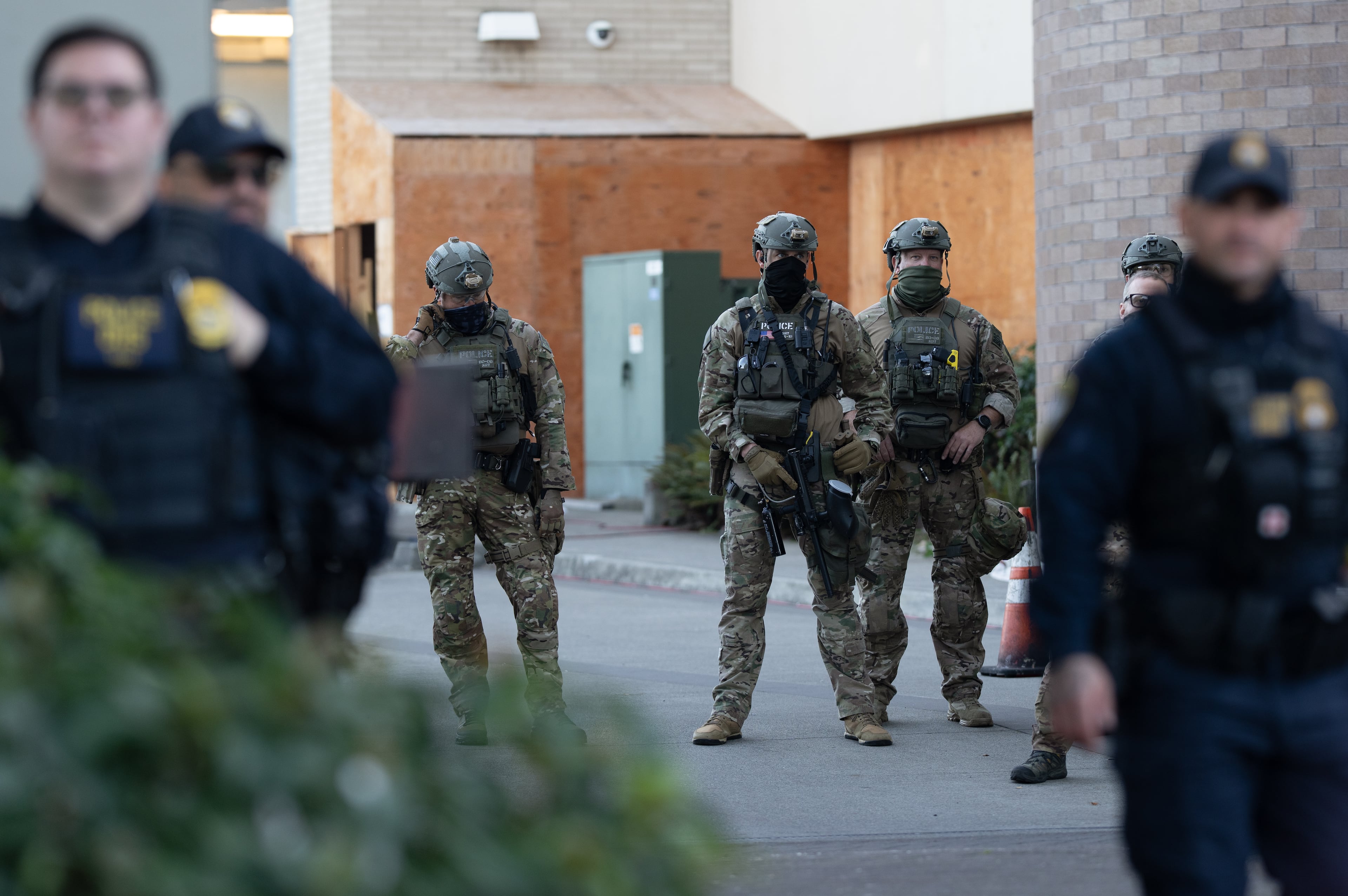More sheriffs partnering with ICE while metro Atlanta holds out

At the beginning of the year, just five Georgia sheriffs were signed up for a controversial federal program known as 287(g), which allows local law enforcement officers to perform some of the functions of immigration agents.
As of June 26, that number has grown to 24, with two additional Georgia sheriffs set to join the growing list when their pending applications are approved, according to officials with U.S. Immigration and Customs Enforcement.
State government is also joining forces with ICE.
In March, Gov. Brian Kemp announced Georgia State Patrol troopers would help the federal government identify and arrest immigrants who lack legal status, also through 287(g).
The program’s growing footprint across Georgia heralds a new, more aggressive era of immigration enforcement in the state. And it represents good news for the Trump administration, which has signaled a need to lean on state and local collaboration to boost arrests and achieve their desired level of mass deportations.
“If you are in our country illegally and committing crimes, you have no place in Georgia,” Kemp said in a March statement.
From Jan. 20 through June 10, Georgia accounted for 3,280 ICE arrests — the fourth most nationwide, according to federal immigration arrest data compiled by The New York Times. The number of Georgia arrests significantly outpaces those recorded in states such as New York or New Jersey, which have large immigrant populations but are less friendly toward Trump’s immigration policies, the data shows.
The catalyst behind the 287(g) program’s expansion in Georgia was the 2024 killing of nursing student Laken Riley at the hands of an unauthorized immigrant.
Months following that attack on the University of Georgia campus, the state legislature passed an immigration bill, HB 1105, requiring sheriffs to help enforce federal immigration law. Among the provisions in the bill was a mandate for sheriffs to apply for 287(g) or unspecified similar federal immigration enforcement partnerships.
The sponsor of HB 1105 was state Rep. Jesse Petrea, a Republican from Savannah.
He said in an interview that he was pleased with the uptick of Georgia sheriffs participating in the 287(g) program since the bill was signed into law. The state, he said, is “fully cooperating” with the Trump administration’s crackdown on illegal immigration.
“That was the intention of HB 1105, to make sure that law enforcement fully cooperates with our federal homeland security organizations,” Petrea said.
Although it can take different forms, the 287(g) program most commonly happens in local jails, where officers help identify and process immigrants for deportation after they are booked.
What about metro Atlanta counties?
Under President Joe Biden, ICE did not approve any new applications from local law enforcement agencies to join 287(g). That changed in January, when Trump returned to the White House and issued an executive order calling for the program’s expansion. The number of 287(g) agreements nationwide quickly proliferated.
Georgia cemented county sheriffs’ participation with HB 1105. But despite that mandate, more than 100 Georgia counties still do not appear on ICE list of active 287(g) jurisdictions or those with pending applications.
Petrea said that may be because of federal officials not wanting to partner with some local jurisdictions because there is a bigger need for immigration enforcement elsewhere.
“ICE has to be judicious in how they use their resources,” he said. “I think the holdup now is not the sheriffs, which it was before. The holdup is ICE itself.”
ICE officials did not respond to a request for comment. Petrea said the agency is likely to prioritize “urban counties” with bigger populations of immigrants living in the country illegally.
But none of metro Atlanta’s five core counties, home to the bulk of the state’s immigrant population, have active 287(g) partnerships.
The Clayton County and Gwinnett County sheriffs’ offices did not respond to questions from The Atlanta Journal-Constitution asking why they haven’t signed up for 287(g), or if they had plans to begin the application process.
“The Gwinnett County Sheriff’s Office has been in compliance with House Bill 1105 since it’s implementation,” a Gwinnett representative said in a statement.
A spokesperson for the Fulton County Sheriff’s Office said it had “not been contacted by federal authorities to actively participate in their 287(g) program.” But it is local law enforcement agencies who must contact ICE to establish a 287(g) partnership.
The Trump administration has taken steps to facilitate the application process for sheriffs’ offices by making templated requests for 287(g) agreements available online. It has also shortened required training for local officers.
The DeKalb County Sheriff’s Office sent a letter to ICE inquiring about the 287(g) program in August 2024, under Biden.
“There was no reply,” public information officer Cynthia Williams said.
“As we were requesting but did not receive details regarding the [partnership] process, we plan to reach out again this year. Once we receive the related information, we will consider entering into a Memorandum of Understanding,” she added.
Meanwhile, the Cobb County Sheriff’s Office said it “has submitted all necessary paperwork.” It is not clear why the county is not on ICE’s list showing active applications.
Adherence in Georgia to state law requiring 287(g) applications stands in contrast to Florida, which in recent years also passed its own bill hardening immigration enforcement — including a 287(g) mandate.
As of February, all 67 Florida county sheriffs had formalized their cooperation with ICE through 287(g).
Mike Mitchell is the deputy executive director of the Georgia Sheriffs’ Association. He said HB 1105 doesn’t amount to a mandate when it comes to applying to 287(g).
“Although agencies must ‘seek’ [memorandums of understanding] annually, the ultimate decision to partner is the sheriff’s to make, based on a variety of factors, primarily the availability of resources to meet ICE’s expectations,” Mitchell said in a statement.
He noted that HB 1105 requires sheriffs to take several steps to crack down on illegal immigration independent of entering into formal 287(g) partnerships with ICE, including requirements for local officers to share immigration information with federal agents and keep inmates without legal status in detention longer, to give ICE time to pick them up.
“There’s no doubt” that the number of Georgia sheriffs signed up for 287(g) “will only increase over time,” Michell added.
Georgia counties partnering with ICE through the 287(g) program:
- Bibb County
- Burke County
- Catoosa County
- Columbia County
- Coweta County
- Dade County
- Dawson County
- Decatur County
- Floyd County
- Forsyth County
- Glynn County
- Hall County
- Harris County
- Jasper County
- Lumpkin County
- Madison County
- Monroe County
- Morgan County
- Oconee County
- Pierce County
- Polk County
- Tift County
- Walker County
- Whitfield County


